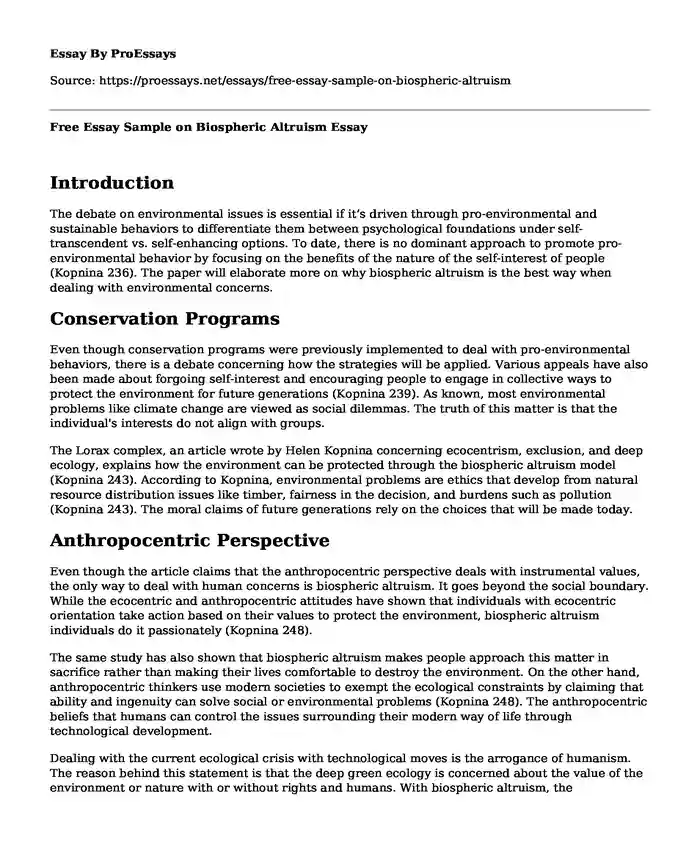Introduction
The debate on environmental issues is essential if it’s driven through pro-environmental and sustainable behaviors to differentiate them between psychological foundations under self-transcendent vs. self-enhancing options. To date, there is no dominant approach to promote pro-environmental behavior by focusing on the benefits of the nature of the self-interest of people (Kopnina 236). The paper will elaborate more on why biospheric altruism is the best way when dealing with environmental concerns.
Conservation Programs
Even though conservation programs were previously implemented to deal with pro-environmental behaviors, there is a debate concerning how the strategies will be applied. Various appeals have also been made about forgoing self-interest and encouraging people to engage in collective ways to protect the environment for future generations (Kopnina 239). As known, most environmental problems like climate change are viewed as social dilemmas. The truth of this matter is that the individual's interests do not align with groups.
The Lorax complex, an article wrote by Helen Kopnina concerning ecocentrism, exclusion, and deep ecology, explains how the environment can be protected through the biospheric altruism model (Kopnina 243). According to Kopnina, environmental problems are ethics that develop from natural resource distribution issues like timber, fairness in the decision, and burdens such as pollution (Kopnina 243). The moral claims of future generations rely on the choices that will be made today.
Anthropocentric Perspective
Even though the article claims that the anthropocentric perspective deals with instrumental values, the only way to deal with human concerns is biospheric altruism. It goes beyond the social boundary. While the ecocentric and anthropocentric attitudes have shown that individuals with ecocentric orientation take action based on their values to protect the environment, biospheric altruism individuals do it passionately (Kopnina 248).
The same study has also shown that biospheric altruism makes people approach this matter in sacrifice rather than making their lives comfortable to destroy the environment. On the other hand, anthropocentric thinkers use modern societies to exempt the ecological constraints by claiming that ability and ingenuity can solve social or environmental problems (Kopnina 248). The anthropocentric beliefs that humans can control the issues surrounding their modern way of life through technological development.
Dealing with the current ecological crisis with technological moves is the arrogance of humanism. The reason behind this statement is that the deep green ecology is concerned about the value of the environment or nature with or without rights and humans. With biospheric altruism, the environment's concerns are centered around groups or individuals within the same species who attribute to the same possession or characteristics (Kopnina 249).
The evidence on environmental issues is not limited to the affluent societies but is known as a genuine universal concern. The study shows that despite the differences in profession and nationality, the biospheric altruism model coincides with people's characters since childhood to show how they are practical in taking care of the environment compared to those that offer less commitment (Kopnina 249).
Conclusion
In contrast to self-interest and humanist altruism, biospheric altruism proves to have an emotional connection with nature because it makes people feel sad when they see something destroyed. The same individuals also have a judge when something wrong is done to eliminate the environment's value. The analysis of this debate shows that the effect of the actions taken by a group is less significant, even if there is a combined collective political action. Therefore, biospheric altruism the most profound way that is publicly expressed in taking care of the environment.
Works Cited
Kopnina, H. "The Lorax complex: Deep ecology, ecocentrism and exclusion." Journal of Integrative Environmental Sciences, vol. 9, no. 4, 2012, pp. 235-254, doi:10.1080/1943815x.2012.742914.
Cite this page
Free Essay Sample on Biospheric Altruism. (2023, Nov 17). Retrieved from https://proessays.net/essays/free-essay-sample-on-biospheric-altruism
If you are the original author of this essay and no longer wish to have it published on the ProEssays website, please click below to request its removal:
- Effects of Noise Pollution Essay
- Washington v. Glucksberg Case Analysis Essay
- The Significance of Flint Towards Environmental Injustice - Essay Sample
- Essay Example on Floods in Indonesia: Devastation, Power Outage and More in 2020
- Global Warming: Understanding Its Effects on Our Environment - Essay Sample
- Free Report on INTJ Personality Type: My Jung Test Results
- Free Paper Sample on Nurturing Success: The Role of Mentors in Guiding and Inspiring Growth







